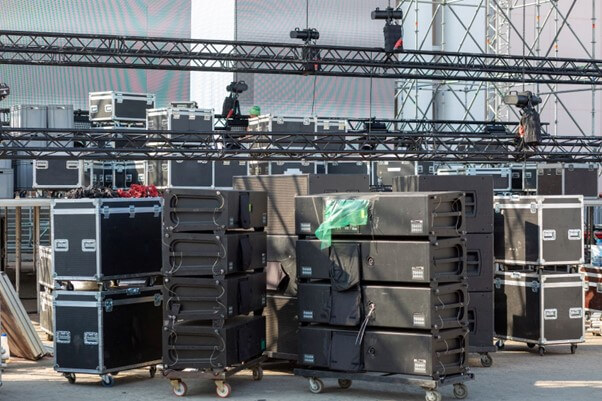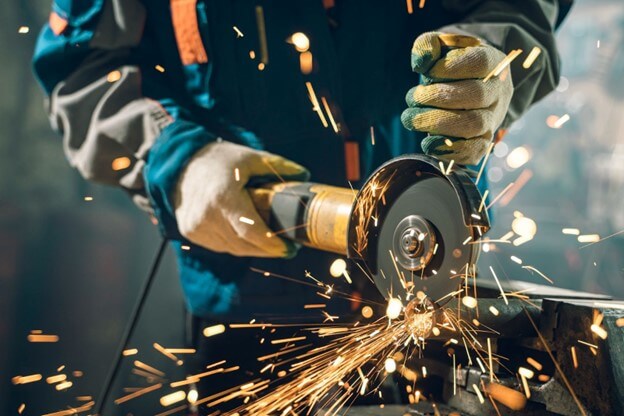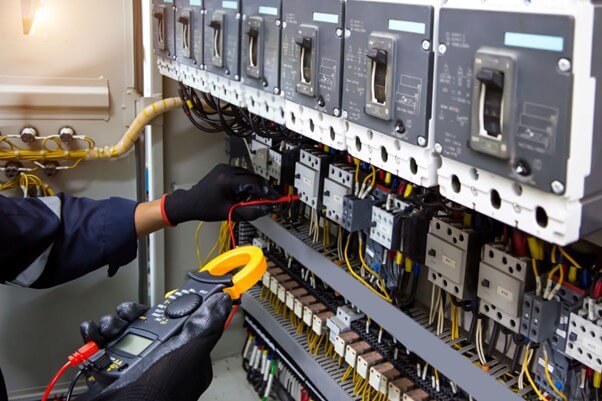Employers often have confusion around what their health and safety responsibilities are.
Accidents and incidents in the workplace can not only be devastating to the well-being and morale of your workforce, but they can also result in costly claims and even costlier reputational damage.
We've put together a guide on who is responsible for health and safety in the workplace and what the competent person should look like.
If you need immediate support with any of these topics, get in touch with one of Croner's dedicated experts on 0800 124 4996.

Who is responsible for health and safety in the workplace?
Employers are responsible for workplace safety. It's their duty to ensure the health, safety, and welfare of their staff. While some worksites come with greater risks than others, even the safest workplaces need all staff to help manage risks.
However, there's some truth to the notion that everyone is responsible for health & safety in their workplace.
All of your staff must be aware of and follow health & safety procedures. Employing a manager can help your business to write comprehensive policies, but hiring someone for this role would not absolve you of your duties.
All breaches of health & safety law, including both accidents and other incidents, ultimately come back to you.
What legislation is in place to enforce health and safety?
One of the main laws affecting businesses in the Workplace (Health, Safety and Welfare) Regulations 1992.
It covers many issues that affect workplaces, such as:
- Sanitary conveniences/washing facilities.
For full details on what the regulations cover, please view the full HSE document.



What can I do to guarantee workplace safety?
Awareness of risks and your policies and procedures is critical to making sure you have a safe workplace.
In addition, conduct risk assessments at suitable intervals and take action to reduce risks as you discover them. Simple acts like unblocking a fire exit, updating respiratory protective equipment, and updating personal protective equipment (PPE), can have a life-saving effect.
Make sure you have safety signs in your workplace.
Give all staff training. These can include:
- What a workplace hazard might be, and the risks one might pose.
- Emergency procedures.
- How to deal with a hazard, if necessary.
Now, some job roles will come with specific risks. So for example, a construction worker might need the training to work at heights.
Above all else, have a constant dialogue with your staff about the importance of health & safety.
Make sure staff know they can come to you if they have an issue. Always investigate any concerns, and where necessary, make adjustments to the workplace or staff job duties.
So for example, if a room has a greater fire risk, make sure it has enough of the correct fire extinguishers.
Principles of general competence
The words competent and competence are used comprehensively throughout health and safety-related legislation, Approved Codes of Practice, and guidance. It is a key element in promoting positive health and safety outcomes.
Competence can be defined as the combination of skills and knowledge that enables a person to make informed decisions and carry out a defined task.
Likewise, HSG65 Managing for Health and Safety describes competence as “the ability to undertake responsibilities and perform activities to a recognised standard on a regular basis”. HSG65 also states “Truly effective health and safety management requires competency across every facet of an organisation and through every level of the workforce”.
The need for competence
The main duty placed on an employer by the Health and Safety at Work, etc Act 1974 (HASAWA) is to ensure the “health, safety and welfare of those affected by their work activities”. According to the Health and Safety Executive, the competence of individuals at all levels of the organisation is vital as it “ensures they recognise the risks in their activities and can apply the right measures to control and manage those risks”.
From a health and safety management viewpoint, competence considers:
- The workforce in carrying out its functions (at all levels of an organisation)
- The person charged with the duty of advising on health and safety matters
- The person(s) charged with undertaking specific tasks (eg risk assessments)


The meaning of competence
The Management of Health and Safety at Work Regulations 1999 states that a person is deemed to be competent if they have an adequate combination of training and experience or knowledge.
Regulation 7(8) requires employers to consider appointing a competent person who is in their employment in preference to one who is not. This means the employer must provide adequate training as required.
In general terms, a competent person should be capable of:
- Undertaking the specified activity safely, at their level of responsibility
- Understanding the potential risks related to the activity that they are to carry out
- Detecting and reporting any defects or omissions
- Recognising any implications for the health & safety of themselves and others
- Specifying appropriate remedial actions that may be required
- Refusing to do a particular task if the potential risk is assessed as too great
Competence benchmarks
Employers will need to identify the appropriate level of competence required in the general workforce and in specific roles. The aim is to understand the amount and types of learning and development that will be needed (typically through information, instruction, training, and supervision as required under HASAWA 1974 Section 2) to ensure that all employees have the right knowledge, skills, and behaviours to perform the jobs they do.
Determining the levels of competence required is essentially about identifying the skills, knowledge, and experience needed to complete a specific task, which can be influenced by:
- The type(s) of work activities, equipment used, substances present, etc
- The need for compliance with legislative requirements
- Guidance on competency in any Approved Code of Practice (ACOP) and other guidance
- The complexity of any control measures, operating procedures, and instructions required to control risks.
As an example, under COSHH, the ACOP highlights that to be competent, the person nominated to carry out the assessment should:
- Know how the work activity uses, produces, or creates substances hazardous to health
- Have the knowledge, skills, training, and experience to make sound decisions about the level of risk and the measures needed for prevention or adequate control of exposure
- Have the ability and the authority of the employer to collate all the necessary, relevant information.
Competence in health & Safety
The specific areas for defining competency in health and safety are similar in principle to those for any other function.



The competent health and safety adviser
The function of a health and safety adviser is to assist the management team, at all levels, in awareness, monitoring, and implementation of the organisational health and safety responsibilities.
It is necessary for the adviser to have:
- The core knowledge necessary to understand the issues involved — knowledge of the processes/activities is required alongside knowledge of health and safety legislation and best practice
- Sufficient ability to apply this knowledge practically by putting it in context for those being advised
- Sufficient personal qualities to be able to inform, persuade and advise people with diverse characters and needs, in such a way as to achieve the necessary aims of the organisational safety policy.
The main attributes of competence are the ability to:
- Identify the root problem or issue in a situation
- Identify and obtain sufficient relevant information to determine the cause
- Appreciate the limits of personal knowledge and seek further guidance and help
- Apply the relevant aspects of the core knowledge to formulate a practicable solution — taking into account both legislative requirements and the resources of the organisation
- Implement the solution, most often through a third party (eg a supervisor or manager)
- Monitor the operations of an organisation to attempt to foresee future problems and issues that may arise and take pre-emptive action where possible.
Personal qualities
The health and safety adviser role within an organisation may involve one person or a team of people.
The competent person needs to function as part of a team. This will be either within a health and safety department or as a part of the management team; this requires that he or she communicates effectively with managers and employees throughout the organisation.
Occupational health and safety is constantly changing, along with the needs of all types of enterprises. This is not only in terms of changing legislation. Changes in technology frequently give rise to novel situations with which the competent person has to work. This requires competent persons to be willing to acknowledge the limits of their capabilities and be able to continue their personal and professional development to accommodate these needs or to be willing and able to seek help and advice from other sources.
While there are likely to be other personal qualities or skills that a competent person may need according to different working circumstances, the desirable ones are:
- Resource management skills (time, finances, etc)
- Interpersonal skills to enable them to work in a team and communicate effectively with others (negotiation and facilitation)
- Enthusiasm, determination, and integrity.
- Desire and ability to continue personal and professional development.


General and specific competence
HSE guidance states that “all employees, including senior management, should receive relevant training. This may need to include basic skills training, specific on-the-job training, and training in health and safety or emergency procedures”.
Therefore, staff at all levels of the organisation will require some form of competence to enable them to undertake their duties. This can range from senior managers having an understanding of safety management to an employee being trained in how to use personal protective equipment in an appropriate manner.
When setting out the organisation’s policy on health and safety along with the necessary planning and organisation to implement it, consideration has to be given to the level of competency required throughout the organisation to ensure there is a competent workforce.
By identifying the necessary key health and safety competencies of individual roles, the amount and types of learning and development that will be needed (typically through information, instruction, training, and supervision) to ensure that all employees have the right knowledge, skills, and behaviours to perform the jobs they do can be determined.
Factors to be considered when determining competence will include the:
- Work environment.
- Preventive and control measures required.
- Legal requirements and other requirements.
- Health and safety policy.
- Potential consequences of compliance and non-compliance.
- Duties and responsibilities associated with the roles.
- Individual capabilities, including experience, language skills, and literacy.
After the initial analysis of competency levels, it is necessary to have in place arrangements to identify and remedy any shortfalls between the current level of competency possessed by employees, the required level, and what information, instruction, training, and supervision, if any, will be necessary to bridge the gap.
Retaining competence
The main barriers to retaining competence are lack of practice and changing circumstances, for example, the introduction of new technology.

Developing knowledge
Knowledge may be refreshed or increased by attending training courses or workshops.
Other sources of increasing knowledge include conferences and seminars. These can be variable in their relevance to the competent person and so need careful selection. Whatever the content, it is likely to assist the competent person by virtue of the contacts made and the ability to discuss issues with other people.
Practitioners may wish to keep up to date with developments in legislation and case law by reading industry-approved publications.
Another way of refreshing and increasing knowledge is attending branch meetings of a professional body relevant to the competent person’s tasks.
Developing experience
Events where a number of practitioners meet together, e.g. conferences, seminars, and branch meetings can be useful. These gatherings provide a means whereby the competent person can share in the experiences of others. It is quite often the case in the less formal gatherings that anecdotal evidence can provide guidance on a good, or bad, means of approaching a problem.
Developing personal qualities
The issue of developing any employee’s personal qualities is most often addressed across an organisation through the human resources department. This can be achieved through a number of means, but the most common is by encouragement through effective personal appraisal systems.
The appraisal should stress the positive and highlight the negative. An effective appraisal can be a very efficient means of enhancing personal qualities. However, a poor appraisal can severely damage and disempower a competent person.
Again, enabling the competent person to gain an insight into the way that others achieve similar tasks by comparison with colleagues and peers at events is particularly useful.
Specific legislative requirements
The general requirements for competent persons come from the general duties imposed on an employer in s.2 of the Health and Safety at Work, etc Act 1974, but other pieces of legislation make specific mention of competence or competent persons. These requirements are usually related to specific hazards that pose significant risks.

Get expert advice
For advice on H&S in your workplace, including health & safety training, and health & safety consultancy, speak to one of our experts.
Croner has a team of award-winning HR consultants who are specialists in their field. We've been helping businesses for over 80 years and our advice line is open 365 days a year, 24 hours a day. Why not speak to a Croner expert on 0800 124 4996.
Don’t forget you can also use Croner BrAInbox for instant answers to HR and health and safety questions. Croner BrAInbox combines powerful AI with our 80+ years’ experience.

Related resources
Categories
- Business Advice
- Contracts & Documentation
- Culture & Performance
- Disciplinary & Grievances
- Dismissals & Conduct
- Employee Conduct
- Employment Law
- Employment Rights Bill
- End of Contract
- Equality & Discrimination
- Health & Safety
- Hiring & Managing
- Leave & Absence
- Managing Health & Safety
- Moving
- Occupational Health
- Pay & Benefits
- Recruitment
- Risk & Welfare



